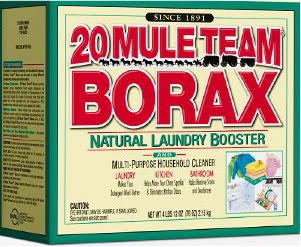 Borate, Boric Acid, and Boron cause confusion. Borax (Na2B4O7-10H2O) and Boric Acid (H3BO3) are made from the natural occurring element, Boron.
Borate, Boric Acid, and Boron cause confusion. Borax (Na2B4O7-10H2O) and Boric Acid (H3BO3) are made from the natural occurring element, Boron.
Although the home flea remedy use of 20 Mule Team Borax and Boric Acid are often found around the internet, it does not mean that these products are non-toxic to pets.
As I’ve said before, natural does not mean non-toxic and I found a good description of the differences in the terms used for pesticide toxicities (such organic and natural) which is worth checking out.
Perhaps Americans continue to recommend boron products since most of the world’s borates come from the United States.
In 1872 FM Smith discovered borates in the Nevada desert and it wasn’t long (1883) before the 20 mule teams began hauling those minerals out of Death Valley and surrounding areas.
Borax is abrasive and so can damage or fade surfaces but it is important to note that although borates are considered to be low toxicity, it does not mean they are not toxic.
The danger to pets is that borates can become concentrated in the kidneys and kidney damage can result.
Dial Corporation, the manufacturer of the 20 Mule Team Borax product has stated, “This product has not been tested nor received approval from the EPA for use as a pesticide.”
Toxic dosages have not been determined for dogs and cats but the concern comes from the risk of ingestion through the cleaning of paws or fur.
A risk to pets exists if you use boron products for flea control in carpets, on flooring, or in similar applications.
Borate toxicity symptoms include:
- drooling,
- vomiting,
- abdominal pain,
- diarrhea,
- depression,
- ataxia,
- hyperesthesia,
- muscle weakness,
- tremors,
- seizures,
- blood in the urine,
- decreased urine production,
- coma,
- and death.
Seek veterinary care immediately if you suspect that your pet has ingested the substance.
So, it is worth the trouble to use Borax or Boric Acid for flea control?
I’d use the less toxic diatomaceous earth (DE) instead but here are some other resources you might want to check out.

